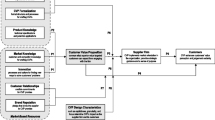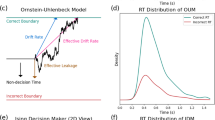Abstract
Recent research indicates that people tend to overestimate the likelihood of an alternative, particularly when an alternative is considered in isolation rather than as part of a set of alternatives. The present experiment shows that subjective market share overestimation and noncomplementary market share estimates are more likely to be observed for individuals who are high (vs. low) in concern about cognitive closure or when a small (vs. large) set of alternatives is considered. Implications of the results for understanding managerial decision making are discussed.
Similar content being viewed by others
References
Fischer, Gregory W., and Scott A. Hawkins. (1993). “Strategy Compatibility, Scale Compatibility, and the Prominence Effect.” Journal of Experimental Psychology: Human Perception and Performance 19(3), 580–597.
Gibson, Bryan, David M. Sanbonmatsu, and Steven S. Posavac. (1997). “The Effects of Selective Hypothesis Testing on Gambling.” Journal of Experimental Psychology: Applied 3(2), 126–142.
Glazer, Rashi, Joel H. Steckel, and Russell S. Winer. (1992). “Locally Rational Decision Making: The Distracting Effect of Information on Managerial Performance.” Management Science 38(2), 212–226.
Kahneman, Daniel, and Dan Lovallo. (1993). “Timid Choices and Bold Forecasts: A Cognitive Perspective on Risk Taking.” Management Science 39(1), 17–31.
Kruglanski, Arie W., and Donna M. Webster. (1996). “Motivated Closing of the Mind: 'seizing' and Freezing.'” Psychological Review 103(2), 263–283.
Meyer, Robert J., and Darryl Banks. (1997). “Behavioral Theory and Naive Strategic Reasoning.” In George S. Day and David J. Reibstein (eds.), Wharton on Dynamic Competitive Strategy. New York: Wiley.
Robinson, Lori B., and Reid Hastie. (1985). “Revision of Beliefs when a Hypothesis is Eliminated from Consideration.” Journal of Experimental Psychology: Human Perception and Performance 11(4), 443–456.
Russo, J. Edward, and Paul J. H. Schoemaker. (1989). Decision Traps. New York: Simon and Schuster.
Sanbonmatsu, David M., Steven S Posavac, Frank R. Kardes, and Susan P. Mantel. (forthcoming). “Selective Hypothesis Testing.” Psychonomic Bulletin and Review.
Sanbonmatsu, David M., Steven S. Posavac, and Randon Stasny. (1997). “The Subjective Beliefs Underlying Probability Overestimation.” Journal of Experimental Social Psychology 33(3), 276–295.
Teigen, K.H. (1974a). “Overestimation of Subjective Probabilities.” Scandanavian Journal of Psychology 15, 56–62.
Teigen, K.H. (1974b). “Subjective Sampling Distributions and the Additivity of Estimates.” Scandanavian Journal of Psychology 15, 50–55.
Teigen, K. H. (1983). “Studies in Subjective Probability III: The Unimportance of Alternatives.” Scandanavian Journal of Psychology 24, 97–195.
Tversky, Amos, and Derek J. Koehler. (1994). “Support Theory: A Nonextensional Representation of Subjective Probability.” Psychological Review 101(4), 547–567.
Van Wallendael, Lori Robinson. (1989). “The Quest for Limits on Noncomplementarity in Opinion Revision.” Organizational Behavior and Human Decision Processes 43(3), 385–405.
Van Wallendael, Lori Robinson, and Reid Hastie. (1990). “Tracing the Footsteps of Sherlock Holmes: Cognitive Representations of Hypothesis Testing.” Memory and Cognition 18(3), 240–250.
Webster, Donna M., and Arie W. Kruglanski. (1994). “Individual Differences in Need for Cognitive Closure.” Journal of Personality and Social Psychology 67(6), 1049–1062.
Author information
Authors and Affiliations
Rights and permissions
About this article
Cite this article
Houghton, D., Kardes, F. Market Share Overestimation and the Noncomplementarity Effect. Marketing Letters 9, 313–320 (1998). https://doi.org/10.1023/A:1008028407624
Issue Date:
DOI: https://doi.org/10.1023/A:1008028407624




